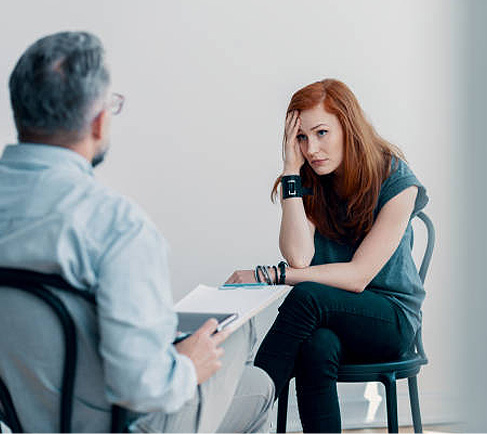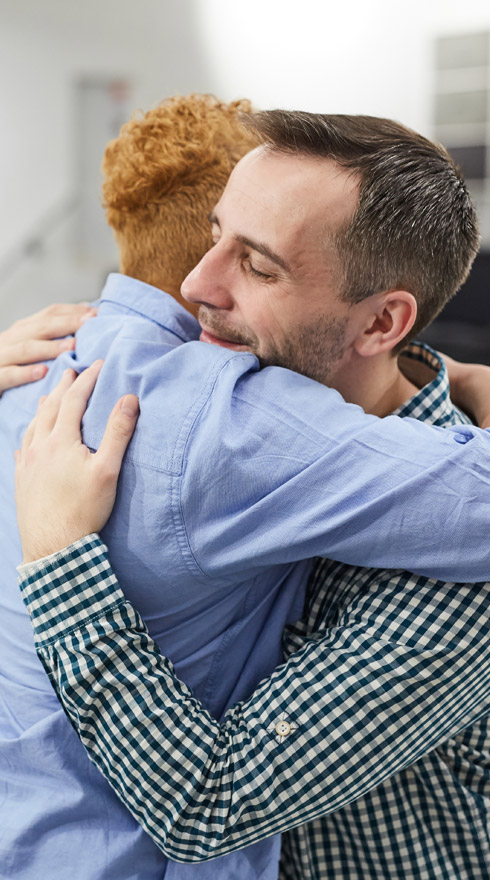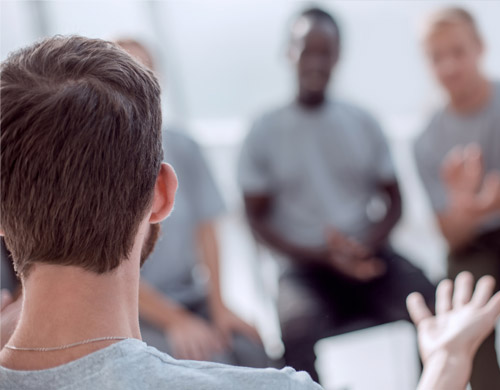What Is Cannabis Addiction?
Some people can use cannabis intermittently and stop but one in every ten users, or 9%, will become addicted. Addiction is a chronic but treatable disease and brain disorder that is typified by using cannabis compulsively, even when the negative consequences are clear. Cannabis abuse can exist without a dependency, but using it often leads to addiction. Cannabis abuse is easier to manage and treat before you develop a dependency or addiction.

Cannabis Addiction Symptoms
One of the clearest signs of a cannabis addiction is your loss of control not to use it, even though you are aware that it has adverse effects on your life. Some of the most common symptoms include:
Developing a higher tolerance
As your cannabis dependency grows, you need to use more to experience the same effects. An increased tolerance is a clear indication of a dependency.
Losing motivation and interest in social activities
People who develop a cannabis dependency find it difficult to make decisions and be motivated to set goals. You may stop enjoying activities you once found pleasurable or lack the motivation to do them.
Your relationships suffer
You may withdraw socially or isolate yourself from friends or family who disapprove of cannabis use.
Experiencing withdrawal symptoms when you don’t use cannabis
If you do not use cannabis for 24-hours, you are likely to experience psycho-emotional and physical cannabis withdrawal symptoms.
Defining Cannabis
‘Cannabis’ refers to the products that are derived from the female cannabis sativa plant. THC is found in the dark resin that covers the plant’s furry leaves and the brown-green flowers of the female plant. Other cannabis products include
- Hash, which can be black or brown and soft or hard in consistency.
- Cannabis oil, which is dark and sticky.
Cannabis contains over 500 chemical substances
There are more than 500 cannabinoids in the female cannabis plant. The cannabinoids of greatest significance are THC and CBD.
Cannabis has a half life of 2 hours
After smoking, cannabis can be detected in blood plasma within a few seconds and users will feel the effects within one to two minutes. THC levels peak within five to seven minutes of smoking cannabis.
Cannabis is used for its psychoactive and medicinal properties
People who use cannabis recreationally do so for the ‘high’ the drug induces. Users report feelings of relaxation and euphoria when they use it in small doses.
The Dangers of Cannabis Addiction
Some of the long-term dangers of addiction include
- Problems with memory and concentration
- Episodes of anxiety or depression
- Reduced dopamine production
- Damage to your lungs and/or a cough
- An elevated risk of heart attack, stroke and infection
This is why many will look for professional cannabis rehabilitation services, as within a residential center, they will receive full support and additional care.
What Is the Difference between Cannabis Addiction and Abuse?
You would be “abusing” cannabis when you use it too much or too often. You would be “addicted” to cannabis when you are unable to stop using it, even though it is having adverse effects on your life.
Some of the signs of cannabis abuse include
- Missing work, school or social events
- Missing your obligations and commitments to other people
- Moodiness
- Denial about a cannabis problem
- Self-isolation

Do You Need Help?
We can help you get better. Together, we can build up your confidence and you can regain control over your life!
Contact us now to ask about our addiction and abuse treatment programs now!
Cannabis Effects
Cannabis affects the body and brain. Its effects can be experienced one to two minutes after smoking, and approximately 45-minutes after consuming it as an edible. The effects may last from 40 minutes to two hours.
While many users report positive short-term effects, long term cannabis use has been documented to affect executive cognitive function, which includes faculties like concentration, inhibition, impulsivity, attention, decision making, risk taking, reaction time, working memory and verbal fluency.
Emotional effects
Cannabis results in short-term euphoric feelings due to a dopamine release, but this sensation becomes more difficult to access when your tolerance increases.
A study conducted by research psychologists at the University of Colorado suggests cannabis impacts on your ability to process emotions, by intensifying negative and positive emotions. Study participants who used cannabis demonstrated a reduced ability to identify emotions and empathize with others “on a deep emotional level”.
Physiological effects
Cannabis causes physiological effects like rapid changes in your heart rate and a decreased respiratory rate. Your eyes will become bloodshot and your mouth and throat are likely to feel dry.
Because your blood vessels dilate, your blood pressure is likely to decrease. An increased appetite is a common after effect.
Psychological effects
The THC in cannabis has a psycho-active effect on the brain. Research indicates that some first-time cannabis users can experience temporary psychosis (paranoia, hallucinations, and distortions of reality). Cannabis use has also been linked to schizophrenia.
Using cannabis affects your capacity for concentration and memory. It has also been linked to depression, social anxiety and suicidal tendencies in users of all ages.
Cannabis use activates and alters your body’s stress response systems, and research suggests that long term and chronic use of cannabis can promote the continued use of it, as part of a dysregulated stress response.
Crime-related statistics
- FBI data shows that 545 602 people were arrested for cannabis-related crimes in 2019. 92% of these arrests were for cannabis possession (as opposed to distributing or dealing).
- There is an association between people with underlying psychological disorders who use cannabis and violence, and with violent behavior in adolescents. A 2012 paper detailing domestic violence among adolescents found that cannabis contributed to a doubling of domestic violence incidents. Other studies conducted on Chinese and British men found that cannabis use was linked to a five-fold increase in violence.

How Does Cannabis Addiction Affect My Family?
Cannabis dependencies affect interpersonal relationships, safety and finances, and put family members at an increased risk of abuse. A family home becomes an unpredictable environment when cannabis addiction is present, and family members go through daily challenges in the face of it. Parents who abuse cannabis give their children less guidance and support.
If a child has a dependency on cannabis, the parents worry and feel responsible or guilty. Some might withdraw emotionally while others might become overbearing and unintentionally enable the habit.
When a child is abusing cannabis the siblings might feel invisible or sidelined as the parents become preoccupied with the other child. Siblings may start using cannabis to get more attention from their parents.
Cannabis Overdose
Even though cannabis isn’t associated with overdose death, it can pose serious side effects.
The challenge in understanding cannabis overdose is everyone has a different tolerance, and levels of THC are not always known. It appears that edibles cause more overdoses than smoked cannabis. The effects from edibles may begin anywhere between 20 minutes and 2 hours after ingestion, so people eat more.
Mixing cannabis and alcohol or other substances may result in an overdose. It is possible to overdose after a period of abstinence, as your tolerance will decrease. This may occur during a relapse, particularly if you have abstained from using it for 24 hours or more.

About Our Drug Addiction Treatment Center
Our Drug Addiction Treatment Center offers a luxurious and non-judgmental space for clients who want to heal and move forward from a cannabis addiction. We have created a peaceful retreat for our clients to step away from your day-to-day stressors and into a supported environment where medical supervision is available 24-hours a day.
We use evidence-based therapeutic interventions to help you achieve your sobriety goals through residential in-patient programs and extended aftercare support. Our team is available to help you to learn healthy coping skills to lead the life you want.
Cognitive behavioral therapy, music therapy, nutrition programs and life skills programs are just some of the methods used to help you regain balance and pleasure in your life.
Why Choose United Recovery CA for Drug Addiction and Abuse Treatment?
Our center has been designed for comfort and safety. We enable our patients to retreat into a luxurious and non-judgmental space where you receive 24-hour medical supervision and clinical interventions to help you forge your long-term recovery path. Once your drug detox is complete you can enroll for inpatient addiction treatment in a familiar setting as you learn the tools and coping skills required to address the underlying triggers that resulted in your drug addiction. Aftercare, support groups and sober living homes provide you with extended care programs that facilitate long term sobriety in an understanding community.









